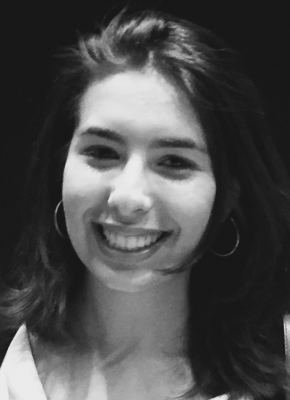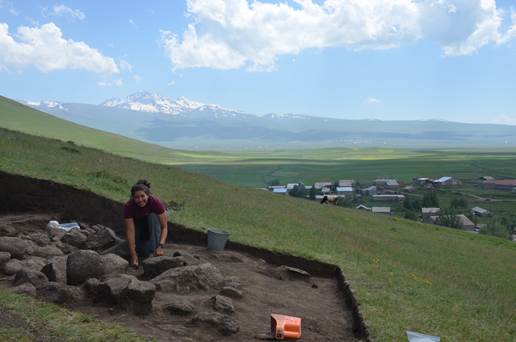Student Spotlight: Gabrielle Borenstein

In summer 2016, Gabrielle Borenstein was awarded the prestigious and competitive Dolores Zohrab Liebmann Fellowship, which was established to support graduate students with outstanding character and ability who hold promise for achievement and distinction in their chosen fields of study. Borenstein is currently doing archaeological research in Armenia.
What is your area of research?
My research explores the various means in which the material world (i.e. objects, representational media, constructed landscapes) influence social, religious, and political life. I am interested in the relationships between the basic elements of daily life, such as labor, production, and ritual, and particular socio-political ideologies. My graduate work explores this in the context of Bronze Age communities in the ancient Near East. Using quantitative methods such as statistical, spatial, and compositional analyses, my work endeavors to address qualitative questions about what it meant to be human 5,000 years ago.
What inspired you to choose this field of study?
My interest in the ancient world grew out of a childhood fascination with mythology, museums, and the overwhelming sense of wonder I felt when imagining distant times and places. My interest in archaeology, in particular, arose from an enduring fascination with human interactions with the material world that surrounds them—their possessions, their environments, other human bodies. During and after undergrad I participated on a number of excavations in Armenia, Cyprus, Jordan, and Israel. Through the broad exposure of these experiences I came to find archaeology a compelling and effective lens to explore social logic, community, and identity formation at various scales across the vast canvas of human history.
Why is this research important?
This research will contribute to a wider anthropology of religion and sociopolitics. It aims to cast new insight on the diverse factors and activities that constitute social identity and facilitate social change. Looking to the past, we can often find answers with present and future pertinence. Archaeology and anthropology are rooted in the idea that human behavior adheres to certain regularities. Economic, psychological, cultural—even ritual—acts have an undergirding rhyme, an underpinning reason. If we can understand the entangled nature of belief systems, economics, and politics in the past—trace the causes, effects, and determinants of and for human behavior—we can evaluate our current state and anticipate where we might be going.
How has your background influenced your scholarship?
My religious background is complicated. My father left an orthodox Jewish community and my mother believed that organized religion was the root of a whole lot of evil in the world. As a result, I lacked identification with and understanding of a particular brand of beliefs. My interest in the past largely stems from this sort of uncertainty in the present. What governs human behavior? How do people build community and what are the factors that prohibit this? How do people find, create, and see meaning in the world? These are the questions that have and continue to fascinate me. The historical and material offer clues; archaeology extends a method and theoretical body through which I can piece together answers. Through the lens of a liberal arts education, I have been able to approach my research critically and creatively, with an interdisciplinary perspective that recognizes the inherently multi-dimensional nature of being across times, places, and cultures.
What else has influenced your thinking as a researcher or scholar?
Scholars are nothing without their teachers. While some of my teachers are only known through their texts—Durkheim, Gell, Heidegger, Schleiermacher, Kierkegaard—I am incredibly grateful to those from whom I have been able to learn firsthand. In particular, I am grateful to my committee members Adam T. Smith, Lori Khatchadourian, and Sturt Manning. They continue to introduce me to new ideas, train me in new methods, challenge my arguments, and inspire me to put forth my best work. Their patience, support, and relentless edits have helped me to exceed my own expectations for what I thought was possible. I am also deeply indebted to my friends, family, and mentors who dwell outside the archaeological world. It is often in those moments when I am forced to abandon disciplinary (and academic) jargon that I come to see things more clearly.

I understand you recently received a Dolores Zohrab Liebmann Fellowship. Congratulations! How did you learn about this fellowship and what was the application process like?
Thank you! I found out about the Dolores Zohrab Liebmann Fellowship through two of my advisors. While it was advertised on a Graduate School blast, it was really their suggestion that compelled me to apply. Like any funding application, the process was not without its share of logistical obstacles. The research and personal statements were straightforward, albeit time-consuming. The compendium of additional documents was a bit of a bureaucratic battle. Though hindsight is 20/20, the process served as a reminder that it can literally pay to be diligent and insistent.
What opportunities will this fellowship provide for you that you perhaps wouldn’t have had access to otherwise?
This fellowship affords me a bit more of the commodity that all graduate students seem to be lacking: time. Free from TA obligations, the DLZ fellowship will allow me to make the most out of the pre-dissertation stage of my Ph.D. I will use this time to take as much coursework as possible in order to acquire all the relevant skillsets necessary to carry out my proposed project.
What are you hoping to accomplish with the assistance of this fellowship?
A whole lot of reading and a whole lot of writing! In addition to required courses in anthropological and archaeological theory, I am using the upcoming year(s) to verse myself in spatial statistics, compositional and elemental analyses, political and economic theory, and a hearty dose of languages. First task on the docket: learning Armenian.
Any advice for other graduate students interested in applying for fellowships or grants?
Be persistent. Be patient. Find trustworthy friends. Grant writing is an agonizing process, but it’s also a healthy exercise. I cannot pretend to be an expert; however, I will say that in my short time at Cornell I have learned that there is no such thing as too many drafts, sets of eyes, or applications. That said, stay true to yourself and your interests. Believe in the work you are doing and if/ when that fails: vino, vent, and get back at it tomorrow.
Why did you choose Cornell to pursue your degree?
I chose Cornell for the people. The Cornell Institute for Archaeology and Material Studies (CIAMS) is both an institute and a community. I feel truly lucky to be a part of a scholarly group that transcends classrooms and lecture halls. It is rare to be surrounded by peers who are also teachers, and advisors who are also colleagues and unparalleled support systems. The university promotes a rich, culturally informed approach to archaeology that I knew would train me to be both the type of academic and individual I aspired to become. The personalized structure and inter-disciplinary nature of Cornell’s anthropology program, coupled with its extensive resources and course offerings made my decision process that much easier.
What’s next for you?
I have about a month left of fieldwork in Armenia this summer and then it’s back to Ithaca! After I get the dirt out from under my nails, I will begin the indefinite process of data synthesis, analysis, and not before long a triumphant return to coursework.
Interview by Sally Kral, communications and outreach assistant in the Graduate School
